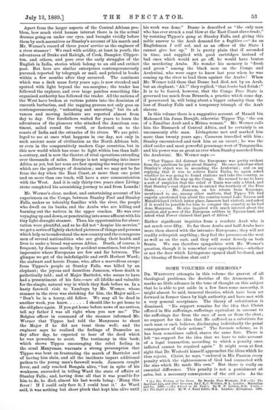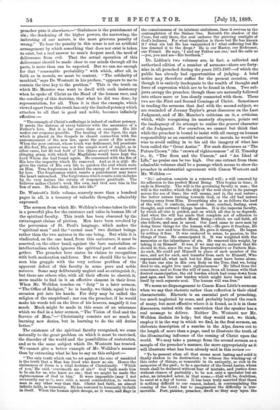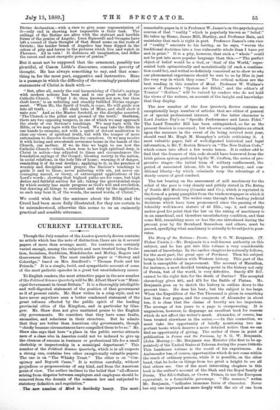SOME VOLUMES OF SERMONS.*
Da. WEBTCOTT attempts in this volume the gravest of all theological problems, the doctrine of the Atonement. It marks no little advance in the tone of thought on this subject that he is able to put aside in a few lines some unworthy, it might -almost be said, immoral theories, which have been set forward in former times by high authority, and have met with a very general acceptance. The theory of substitution is dismissed. "No support remains for the idea that Christ offered in His sufferings, sufferings equivalent in amount to the sufferings due from the race of men or from the elect; no support for the idea that He suffered as a substitute for each man or each believer, discharging individually the penal consequences of their actions." The forensic scheme, as it has been sometimes called, shares the same fate. There is left "no support for the idea that we have to take account of a legal transaction, according to which a penalty once indicted cannot be required again." It might seem at first sight that Dr. Westcott himself approaches the ideas which he thus rejects. Christ, he says, "endured in His Passion every penalty which the righteousness of God had connected with the sins which He made His own." But there is really an essential difference. This penalty is not a punishment ab extra, but a necessary consequence of the evil acts. As the • (1.) The Victory of the Cross. By Brooke Pose Weetcott, D.D. –(2.) The Bpintual Life, and other Sermons. By J. E. D. Welldon, M.A. London: Macmillan and Co. 1888.—(3.) Advent in St. Paul's, By H. P. Liddon, D.D. 2 role.— (4.) The Light of Life. By W. J. Knox Little, MA. London: Rivingtons. 188O. preacher puts it elsewhere,—" Sinfulness is the punishment of sin; the deadening of the higher powers, the narrowing, the imbruting of our nature, is the most grievous penalty of wrong." To bear the penalty in this sense is not an artificial arrangement by which something that does not exist is taken to exist, but a real answer to man's deepest need, the need of deliverance from evil. That the actual operation of this deliverance should be made clear to our minds through all its parts, is more than can be expected. But we can see enough for that "reasonable probability" with which, after all, in faith as in morals, we must be content. "The solidarity of
mankind," says Dr. Westcott in his preface, "appears to me to contain the true key to the problem." This is the truth on which Mr. Maurice was wont to dwell with such insistency when he spoke of Christ as the Head of the human race, and the corollary of this doctrine, that what he did was done, by representation, for all. Thus it is that the example, which viewed apart from this truth has only the limited potency which attaches to all that is good and noble, becomes infinitely effective :--
"The example of Christ's sufferings is indeed of endless potency. It meets the distress of every believer with the assurance of a Father's love. But it is far more than an example. His life makes our response possible. The healing of the leper, the sign which is placed in the Gospels in closest connection with the announcement of the new law, opens the secret of His action. When the poor outcast, whose touch was defilement, fell prostrate at His feet, His answer was not the simple word of might, as in other cases, but He took hold of him (3l4ar° airroi;) with that firm, clinging grasp, with which the Magdalene would have kept the Lord Whom she had found again. He consumed with the fire of His love the impurity which He removed. And so it is still: He gives the virtue of His own life to quicken the sdul which rests on Him. True forgiveness is indeed the energy of love answered day love. The forgiveness which remits a punishment may leave the heart untouched. The forgiveness which remits a sin includes by its very nature the return of responsive gratitude. The believer makes Christ's work His own, and God sees him in the Son of man. He dies daily, dies into life."
Dr. Westcott's little volume, scarcely more than a hundred pages in all, is a treasury of valuable thoughts, admirably expressed.
The sermon from which Mr. Welldon's volume takes its title is a powerful plea for the existence and value in human life of the spiritual faculty. This truth has been obscured by the extravagant claims of pietism. Men have been revolted by the perversion of St. Paul's language, which makes the "spiritual man" and the "carnal man" two distinct beings, rather than the two natures in the one being. But while it is vindicated, on the one hand, from this caricature, it must be asserted, on the other hand, against the bare materialism or intellectualism which ignores the spiritual part of man alto- gether. The preacher here states its claims to recognition with both moderation and force. But we should like to have seen him grapple with the very serious problem of the apparent defect of this faculty in some pure and noble natures. Some may deliberately neglect and so extinguish it; but there are others who, with all their efforts to cherish it, seem unable to find in it an effective element in their lives. When Mr. Welldon touches on " duty " in a later sermon, "The Office of Religion," he is hardly, we think, equal to the occasion put into his hands. For duty may be called the religion of the unspiritual ; nor can the preacher, if he would make his words tell on the lives of his hearers, magnify it too much. Much might be made in this sense of an utterance which we find in a later sermon, "The Vision of God and the Service of Man,"—" Christianity consists not so much in learning new duties, but in learning to do the old duties better."
The existence of the spiritual faculty recognised, we come naturally to the great problem on which it must be exercised, the disorder of the world and the possibilities of restoration, and so to the same subject which Dr. Westcott has treated.
We cannot give a better example of Mr. Welldon's manner than by extracting what he has to say on this subject "The only truth which can be set against the sins of mankind as the truth that a Man has lived who knew no sin. Hence the sinlessnesa of Jesus is a vital doctrine of Christianity. Which of you,' He said, convinceth me of sin?' God 'bath made him to be sin for us, who knew no sin.; that we might be made the righteousness of God in him.' It were impossible (may I not reverently say so ?), save with a moral contradiction, to redeem manin any other way than this. Christ had faith, an almost infinite faith, in humanity. He has restored to humanity its faith an itself. When the human spirit droops, as it were, and flags in the consciousness of its intrinsic sinfulness, then'it revives in the contemplation of the Sinless One. Beneath the shadow of the Cross, but only there, the soul endures the piercing sunlight of God's holiness. For what temptation is there but He has known it ? what sin but He has vanquished it what suffering but He has drained it to the dregs ? He is our Master, our Redeemer, our Friend. He says, I and my Father are one,' and He calls us —yes, you and me—His brethren."
Dr. Liddon's two volumes are, in fact, a collected and authorised edition of a number of sermons—there are forty- nine in all, preached during the years 1871-1887—of which the public has already had opportunities of judging. A brief notice may therefore suffice for the present occasion, even though it is entirely inadequate to the wealth of thought and force of expression which are to be found in them. Two sub- jects occupy the preacher, though these are naturally followed into others more or leas closely connected with them. These two are the First and Second Comings of Christ. Sometimes in reading the sermons that deal with the second subject, we are reminded of Jeremy Taylor's great discourse on the Last Judgment,-and of Mr. Mauriee's criticism on it, a criticism which, while recognising its masterly eloquence, points out the inadequacy of its attempt to realise the general character of the Judgment. For ourselves, we cannot but think that while the preacher is bound to insist with all energy on human responsibility as an essential sanction to morals, he would be wise to avoid calling in to his aid the imagery of what has been called the "Great Assize." For such discourses as "The Future Crown" (the "crown of righteousness" of II. Timothy iv., 8), "The Seen and the Unseen," and "An Ideal of Life," no praise can be too high. Our one extract from these admirable volumes shall be a passage which seems to show the preacher in substantial agreement with Canon Westcott and Mr. Welldon :— " No ! salvation consists in a renewed will ; a will renewed by its adhesion to the perfect Moral Being. This begins in time; it ends in Eternity. The will is the governing faculty in man ; the will is the rudder, which the ship of the soul obeys in its passage across the sea of thus; the will means, and is, the real nature ; the better nature turning towards God, or the old bad nature turning away from Him. Everything else in us follows the lead of the will; it controls, sooner or later, conduct, feeling, even thought, and outward things besides. It is the imperial faculty, by which all else is guided, and on which all else in us depends. And when the will has made that complete act of adhesion to Jesus Christ—the perfect Moral Being—which we call faith, all else follows, and man is saved. Our Lord came to save men by doing three things for the human will,—He gave it freedom, He gave it a new and true direction, He gave it strength. He began by setting it free. It was enslaved to sense, to passion, to the things of time. He emancipated it. It was weighted with the memories or the inheritance of sin. He removed this weight, by faking it on Himself. It was, if we may say so, natural that He should do this, since He was the Representative or Pattern Man. As such, He could put Himself in place of each member of the race, and act for each, and transfer from each to Himself, Who represented all, what each but for Him must have borne alone. He bare our sins in MB own Body on the Tree, that we, being dead to sin, might live unto righteousness.' He lifted from the conscience, and so from the will of man, from all human wills that desired emancipation, the old burden which had come down from past ages, and the new burden which might have been laid on itself by each separate soul. The human will was free."
We mean no disparagement to Canon Knox Little's sermons when we say that rhetoric rather than reflection is their chief characteristic. Rhetoric is an essential part of preaching, too much neglected by some, and probably beyond the reach of many, but most effective where it is found, as it is in these discourses, united with the conviction that the speaker has a real message to deliver. Neither Dr. Westcott nor Mr. Welldon disdain its help ; but they would not, we think, employ it in the way in which we find, in the first sermon, an elaborate description of a sunrise in the Alps, drawn out to the length of more than a page, used to illustrate the truth of the illuminating influence of the coming of Christ upon the world. We may take a passage from the second sermon as a sample of the preacher's manner, the more appropriately as it will illustrate what has been already said in this review :— " To be present when all that seems most lasting and solid is finally shaken to its destruction; to witness the winding-up of this order of things, so venerable in its antiquity, so rich in its memories of the past ; to be a spectator of the Great Assize, where truth shall be declared without fear of Mistake, and justice done without chance of partiality ; to be not only a spectator but an actor, an intended actor, in that scene ;—that will be, doubtless, to assist at a day of terror. It has been truly asserted that there is nothing difficult to our reason, indeed, in contemplating the coming of the Lord ; but to imagination the difficulty is irre- movable. Poet, painter, preacher, dwell as they may upon the
• Divine declaration—with a view to give some representation of it—only end in showing how impossible is their task. The ceilings of the Sistine are alive with the stalwart and terrible forms of the genius of Angelo ; Luca Signorelli and Orcagna have left a record of their thought of that dread scene on the roofs of Orvieto ; the tender brush of Angelico has been dipped in the colour of pity and terror in the pictures which live and watch in Florence. All in vain ! It distances all imagination, and defies the rarest and most energetic power of genius."
But it must not be supposed that the ornament, possibly too plentiful, of Canon Little's discourses, conceals poverty of thought. He has always something to say, and that some- thing is, for the most part, suggestive and instructive. Here is a passage in which the difficulty of the seemingly paradoxical statements of Christ is dealt with ;—
" But, after all, surely the real harmonising of Christ's sayings -with modern actions has been and is one great work of the Catholic Church. 'What I do thou knowest not now, but thou shalt know,' is an unfailing and steadily fe1311 ed Divine engage- ment. When He, the Spirit of truth, is come, He will guide you
into all truth He shall take of Mine, and shall show it unto you.' And as the Master foretold, so the disciples asserted, 'The Church is the pillar and ground of the truth.' Brethren, there are two opposing tempers, in one of which we may approach the study of our Saviour's teachings. We may begin with the Bible, or we may begin with the Creed. We may take the Bible in our hands to examine, not with a spirit of devout meditation to clear our views of spiritual truth, but with the temper of mere rationalism to discover doctrines for ourselves. Or we may receive it with loving and awe-struck reverence borne in the hands of the Church, our mother. If we do this we begin to see how the Catholic Church—which, when true to her high spiritual duty, is Christ in action—has adjusted to times and circumstances the foundation sayings of the Gospel; blessing society in the nation, in social relations, in the holy life of home; warning it of danger, reminding it of its real destiny; applying to it, in the practice of worship and discipline and prayer, the Saviour's teachings to guide it and to bless ; never paltering with sin, yet never en- couraging unreal, or viewy, or extravagant applications of the Lord's 'words; showing that highest paths are for some, but high duties and faithful service for all ; taking the providential steps by which society has made progress as God's will and revelation, but drawing all things to restraint and duty by the application, as each may bear it, of the words, the sacred words, of Christ."
We could wish that the sentence about the Bible and the Creed had been more fully illustrated, for they are certain to be misunderstood, otherwise this seems to us an eminently practical and sensible utterance.




































 Previous page
Previous page